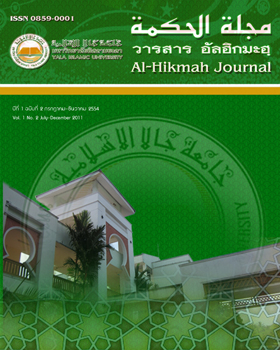แนวทางการมีส่วนร่วมของผู้ปกครองนักเรียนในการจัดการศึกษาปฐมวัย ในโรงเรียนอนุบาลอิสลามในจังหวัดชายแดนภาคใต้
Keywords:
การมีส่วนร่วมของผู้ปกครองนักเรียน, การจัดการศึกษาปฐมวัย, โรงเรียนอนุบาลอิสลามAbstract
Primary education is very crucial to child development as the establishment of developing children in accordance with Allah’s desire and to be the future nation power. The main point is that child development from birth to six years is the most vital stage of various developments: physical, emotional, mental, cognitive and personality. Management of early childhood education is thus apparently significant. Appropriate organization of educational experience is needed for children’s positive attitudes towards learning. To achieve goals, close corporation between school and parents is required. This research aims to present the Islamic concept of early childhood education management, concepts of early childhood education management in Thai society and southernmost provinces, problems and difficulties in development of parents’ participation in the education management.
References
http://learners.in.th/blog/thanatta-edu3204/178643 [23 เมษายน 2553]
ม.ป.พ. ม.ป.ป. ความหมายการศึกษาปฐมวัย (ออนไลน์). ม.ป.พ. ม.ป.ป.
http://thesis.swu.ac.th/swuthesis/Ear_Chi_Ed/Haruethai_A.pdf . [23 เมษายน 2553]
สำนักงานคณะกรรมการการศึกษาแห่งชาติ. 2545. พระราชบัญญัติการศึกษาแห่งชาติ พ.ศ. 2542 และที่แก้ไขเพิ่มเติม (ฉบับที่ 2) พ.ศ. 2545. กรุงเทพฯ: พริกหวานกราฟฟิค.
อรุณี หรดาล. 2536. ผู้ปกครองกับการจัดการปฐมวัยศึกษา. มหาวิทยาลัยสุขโขทัยธรรมาธิราช.
อิบราเฮ็ม ณรงค์รักษาเขต, ม.ป.ป. การศึกษาในภาคใต้. (ออนไลน์).สืบค้นจาก :
http://albasra1.multiply.com/tag/ [23 เมษายน 2553]
Epstein. Joyce L., 1995. School/Family /Community Partnerships. Phi Delta Kappa, May, pp. 701-712.



